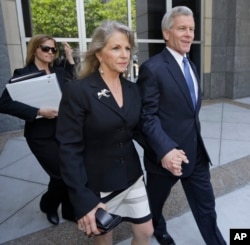The corruption convictions of Virginia's former governor and his wife represent an aggressive strategy by the FBI and the Department of Justice to identify and punish official misconduct while in office.
In a Richmond, Virginia, federal courtroom Thursday, Republican Robert McDonnell, 60, was convicted of 11 counts, including charges of conspiracy, bribery, and extortion. His wife, Maureen was found guilty on nine of 14 charges.
Improper actions
The McDonnell case, which has been in motion since 2013, centered on whether the governor and his first lady acted improperly in accepting at least $50,000 in gifts and $120,000 in loans from Richmond businessman Jonnie Williams.
Williams, the founder and CEO of a company called Star Scientific, wanted the governor to promote his products, especially a dietary supplement.
Williams, the prosecution's star witness during the trial, was given full immunity in exchange for his testimony.
McDonnell and his lawyers argued that it was the duty of a governor to promote the state’s businesses and that there was no “quid pro quo” between Williams’ gifts and favors and official endorsement of Star Scientific.
The ex-governor’s lawyers also tried—and failed—to pin any improper behavior on McDonnell's wife.
“The jury did not believe Bob McDonnell’s testimony,” said University of Richmond Law Professor Henry Chambers. “They appear to believe that he took official actions in exchange for gifts and loans. In addition, they appear to believe that Bob and Maureen were in cahoots [conspired] in doing so.”
No immunity for public officials
Though the indictment against the couple wasn’t announced until 10 days after McDonnell left office, charges could have been filed while he was still governor.
Unlike many countries, the United States as a whole, and the individual states, do not afford elected officials immunity during their time in office. There have been plenty of instances over the years where sitting U.S. officials at various levels of government have been arrested and tried while still holding their posts.
Letting the case go to trial was a failed gambit for the McDonnells. Months ago they were offered a deal by federal authorities: if the governor agreed to plead guilty to one count of bank fraud—making false statements—the federal government would go no further. Under that deal, Maureen McDonnell would not have been prosecuted.
“McDonnell may have rejected the plea based on a belief that he was not guilty of the bank fraud and false statement charges,” said Chambers. “That may have fed into a belief that the government likely had even less evidence to support a conviction for the public corruption charges. If that was his mindset, rejecting the plea deal made sense.”
Wake-up call
Some McDonnell trial observers say this case should send a wake up call to politicians in the United States.
“I really cannot stress strongly enough how badly people are missing the boat if they think this is limited to Richmond,” Richmond attorney Chuck James told the Politico newspaper. “If politicians don’t look in the mirror and question their actions after this, they do so at their own peril.”
Related report by VOA's Arash Arabasadi
Historically, Virginia has had rather weak laws governing official behavior. There has been a romantic tradition in the state, called “The Virginia Way,” under which officials are deemed to be honorable people who act properly until proven otherwise.
But in the United States, the federal government’s regulations ultimately trump such rules, and expose them to prosecution if violated.
McDonnell’s successor as governor, Democrat Terry McAuliffe, has pushed for ethics reforms since taking office in January. But McAuliffe faces a Republican-controlled legislature, and to some observers, that partisanship could make new laws and regulations difficult to pass.
Rise of populism
But that not may be the case, according to University of Richmond political science professor Dan Palazzolo. He said the jury’s verdict in the McDonnell case may be a reflection of a social phenomenon—populism—that has grown in recent years.
“[There has been] a general rise of populism in response to public affairs since the 2008 bank scandal,” he said. “Jurors bring perceptions of what is right and wrong with them to a trial, and the public has become much more sensitive to actions taken by powerful elite decision makers. This case exposed to the public and the jury an extreme case of what is wrong with public leadership in America today.”
Sentencing for Bob and Maureen McDonnell is set for January 6. Ahead of that, their separate legal teams say they plan to appeal the convictions. If all convictions stand, both face up to 30 years in prison.
But, as is often the case, some of the convictions may be reversed on appeal. But rarely are all convictions dismissed.
“The McDonnells are likely facing guideline sentencing ranges of 10 years or even longer based on the offense facts described here,” said Ohio State University Law Professor Douglas Berman in his “Sentencing Law and Policy” blog.
“I presume they should be able to get some top-flight attorneys to make some top-flight arguments for below-guideline sentences,” he wrote. “But, at least for now, I am inclined to urge former Gov. McDonnell to expect to be celebrating his 65th—and maybe also his 70th—birthday in the 'Graybar Hotel' [prison].”








